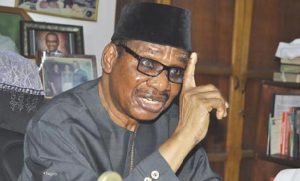
Professor Itsey Sagay, Chairman of the Presidential Advisory Committee on Anti-Corruption (PACAC) has decried illicit financial flows saying it is a threat to the stability of Africa. He stated this during a virtual round table marking the 5th AU Day of Anti-Corruption. Sagay, who was represented by the Secretary of PACAC, Professor Isah Raad, says corruption undermines social stability across the world and believes Africa is worse-hit as evidenced from the low development indices. The markers of corruption, he says are “seen from low levels of educational development and attainment, unemployment, violence, drug abuse, conflict, internally displaced persons camps and so on”.
Given the hydra-headed nature of corruption, Sagay says countries will need to collaborate more to achieve better results in the fight against ill-gotten wealth. “Corruption is a trans-border crime and Africa bleeds a lot of resources through illicit financial flows committed mostly by elites and enabled by the existence of safe havens. We must come together to combat these illicit flows and recover stolen assets” he asserts. Closing safe havens he believes will require Africa countries to speak in unison at international fora including the United Nations. The PACAC Chairman is optimistic that good governance, transparency and accountability will go a long way in tackling corruption in Africa even as he called on regional economic blocs to be in the vanguard of the fight against corruption.
While delivering his opening remarks, Professor Bolaji Owasanoye, Chairman of the Independent Corrupt Practices Commission (ICPC) commended the efforts of the anti-corruption agencies while identifying areas of improvement. Professor Owasonoye is more concerned with the prospect of increasing illicit financial flows with the signing and coming into force of the African Continental Free Trade Area (AfCFTA) which will create room for corrupt practices such as transfer pricing, and tax evasion. “The AfCFTA is a welcome development and Nigeria as the largest economy in Africa is set to benefit from it. However, we have to guard ourselves against the fact that criminals will be lurking around to take advantage of the opportunities of increased commercial activities” he says. ICPC, he says, is strengthening regulatory standards, building capacity and collaborating with other agencies in order to build a buffer against criminals.
Preventing crimes before they happen is more important for the Nigerin Financial Intelligence Unit (NFIU) according to the Director/CEO, Mr Modibbo Tukur. He cited the need to improve information and recovered asset management as areas that need urgent improvement. He decried leaks associated with corruption cases even as investigation is ongoing and prosecution is yet to file cases. According to Tukur, the leaks are bad for the image of the country just as cooperating countries that offer assistance during investigation get irritated. Digitisation of cases and data connectivity, Tukur says will also improve the fight against corruption. He says the NFIU is going fully digital by september 1 hence will no longer need a budget for stationeries.
He also said poor management of assets recovered by the Economic and Financial Crimes Commission (EFCC) has cost the country money. “There are a lot of recovered assets that depreciate quickly because of poor storage and preservation. We need to improve in this area” he says.
The EFCC is focusing on its five strategic plan which is to improve collaboration with other agencies including in intelligence sharing, research and law enforcement according to Ahmed Saad, the Director of Intelligence. He called on the Regional Economic Communities (RECs) to domesticate and institutionalise the processes of AU anti-corruption measures in order to track the effectiveness of enforcement.
In his goodwill message, Dr Oliver Stolper, the United Nations Office on Drug and Crime (UNODC) Nigeria Country Representative commended the efforts of the anti-corruption agencies especially in its synergy with international agencies. He says Nigeria is a leader in the fight against corruption and has a lot of institutional knowledge to share with others saying he is proud that Nigeria’s knowledge and experience helped shape the final declaration on anti-corruption at the United Nations General Assembly. Dr Stolpe however identified areas that need improvement which include tackling bribe-seeking behaviour in areas such as vote-buying, public service recruitment and gender inequality.
By Osaze Omoragbon

